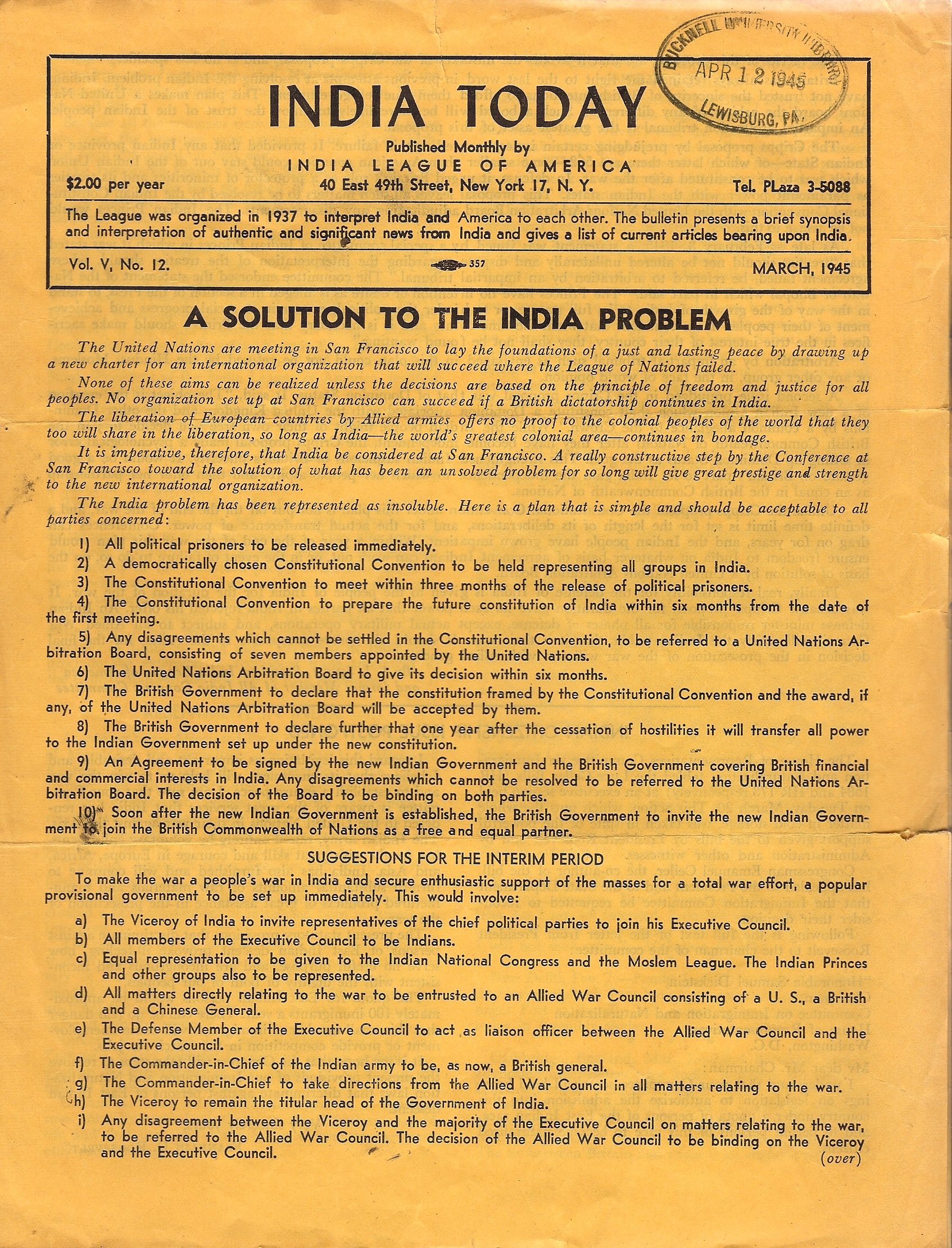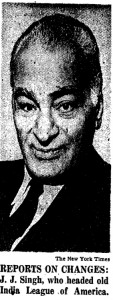Papers: ca. 1924-1973. Manuscript Division, Library of Congress.
The following is a list of the documents that I felt were relevant to my project. I’ve included either excerpts or paraphrased the documents or noted that I made a copy of the document itself. Anything in bold indicates it is particularly significant.
Box 48: Subject File: J.J. Singh, correspondence, August 1951-December 1956
Speech of Sirdar J.J. Singh, President, India League of America, delivered at the evening Plenary Session of the Colgate University Conference on American Foreign Policy, Hamilton, NY, on Sunday, July 22, 1951.
- “The topic was ‘the Role of the United Nations in Asia.’ The other participant was Senator Leverett Satonstall.” [JJ’s status as an expert, speaking opposite a senator]
- “I was in San Francisco at the time of the United Nations Conference on International Organization. I covered this conference as a special correspondent for several Indian newspapers. I cabled hundreds of words every day to my papers. I was there from the day it opened until the day it closed. I watched the trials and tribulations of the organizers and the participants, and the reactions of the general public to the activities of the conference. Those of us who were at the San Francisco conference—the birthplace of the United Nations—will never forget the exciting and stimulating time we had. (1)”
J.J. Singh to Emanuel Celler, April 18, 1952 [copy]
Emanuel Celler to J.J. Singh, January 29, 1953
- “Dear J.J.: Whatever happened to the Gandhi Memorial and the India League? The State Department has been asking me this question. With kindest personal regards, I am, Sincerely yours, Emanuel Celler”
Business Card reads “J.J. Singh” in a stylized font, with “New York City” in the lower right-hand corner. [copy]
- On the card, J.J. wrote: “Mannie: I thought you might like to have this. JJ” [JJ’s signature is two loopy j’s]
The following resolution was adopted by the Executive Committee of the India League of America on Tuesday, April 10, 1956:
- The ILA is dedicated to “creating understanding and friendship between the people of India and the people of the United States”
- However, “government to government aid has unfortunately created misunderstanding and resentment both in India and the United States,” and so the ILA recommends that the US send aid through international agencies, like the UN, to improve the relationship between the 2 countries
Box 497: Subject File: India-correspondence, 1944-1947
J.J. Singh to Emanuel Celler, April 11, 1945 [copy]
- “Dear Mr. Celler”—more formal?
For immediate release Wednesday, March 21, 1945, “India and San Francisco Conference,” from the India League of America
- “Direct words from India of intense resentment at the appointment of three ‘collaborationists’ to repred[s]ent India at the San Francisco Conference was received here yesterday by Sirdar J.J. Singh, president of the India League of America. Mr. Singh made public the text of a statement he received from C. Rajagopalachari (C.R.) famous India moderate leader, and former Premier of Madras called for a reconsideration of the appointments. … Commenting on C.R.’s statement and the appointments, Mr. Singh said: ‘we know that the future of the world peace depends of effective international cooperation, but the San Francisco Conference will be building on a foundation of sand if it accepts the Viceroy’s appointees as representatives of India’s 390 million people. These three titled collaborationists have no following whatsoever anywhere in India. They represent nobody but the Governor General who appointed them and by whose grace they will be permitted to come here. At San Francisco they can accept no obligations for the people of India. An Indian government with popular support, which is bound to come in the near future, may very well repudiate them. These men are persona non grata with Indians’” (1-2).
Emanuel Celler to Pearl S. Buck, February 26, 1946, Western Union
- “gladly” accepts invitation to put name on cable to Prime Minister Atlee as well as placing the cable and names of signatories in the Congressional Record
- The cable, signed by Buck, Louis Fischer, and J.J. Singh, urges the British to help instate an interim Indian government
*Emanuel Celler to Pearl S. Buck, J.J. Singh, Richard J. Walsh, January 18, 1945
- “Dear Friends: In reply to your letter of January 12th, I herewith give you a message for the celebration of India Independence Day of January 26th. The World cannot exist half free and half slave. India is now enslaved. Its shackles must be removed. Only then can she politically and economically breathe freely. We in America deeply sympathize with India’s plight. But sympathy is not enough. There must be developed here such a militant public opinion that England cannot resist. The coming of Mrs. Pandit is helpful. We welcome her as a sister. Even so we welcome her brother. Yours very sincerely,”
Emanuel Celler to Henry Buck, New York, June 3, 1947
- “there is the need for the consummation of a trea[t]y of Friendship, Commerce and Navigation between India and the United States. Knowing your interest in India, I thought you might use one or more of your publications to present this matter to the public.”
- “My interest in India is unflagging and I want to present in concrete from my desire to aid India and thereby aid the United States. There is very little known about India in the United States and vice versa. You might be the medium through which both countries would get to know each other better.”
Dr. Anup Singh to Emanuel Celler, Washington, July 11, 1947
- “Many thanks for your kind sentiments about my new appointment in the Embassy of India. I shall be very happy to drop in to see you one of these days. I am counting upon the cooperation of good friends of India like yourself in my new responsibility.”
Emanuel Celler to Jawaharlal Nehru, New Delhi, July 14, 1947, telegram [copy]
Emanuel Celler to Honorable William L. Clayton, Under Secretary of the State, Washington, 1947?
- K.A.D. Naoroji= “president of Tata, Inc, 90 Broad Street, New York, is the direct representative of the famous group of Tata industries in India.”
Box 498: Subject File: India League of America
Excerpts from speeches made on the occasion of the Farewell-Public Meeting of the India League of America, held on Wednesday, February 11, 1959, at the Community Church of New York, 40 East 35th Street, New York [copy]
Excerpts from remarks made, on messages received, on the occasion of a Farewell Dinner by the India League of America in honor of Sirdar J.J. Singh, President of the India League, on Monday. February 23, 1959 at Ceylon India Inn, 148 West 49th Street, New York [copy]
Messages received for Farewell-Public Meeting [copy]
- Includes messages from Emanuel Celler, Supreme Court Justice William O. Douglas, former Postmaster General of the United States James. A Farley, Chairman of the Senate Foreign Relations Committee Senator J.W. Fulbright, Member of the House Foreign Affairs Committee Representative James G. Fulton, U.N. Representative in India and Pakistan Dr. Frank P. Graham, Minister Emeritus of The Community Church Dr. John Haynes Holmes, Publisher of Time, Life, Fortune Henry R. Luce, Senator Karl E. Mundt, Assistant Secretary of State William M. Rountree
Congressional Record, Appendix, February 9 [copy]
Invitation to ILA Farewell Meeting [copy]
J.J. Singh to Emanuel Celler, Washington, January 26, 1959 [copy]
J.J. Singh to Emanuel Celler, Washington, May 24, 1951 [copy]
Box 500: Subject File: India-J.J. Singh, 1946-69
“India-America Relations” by J.J. Singh [copy]
Messages of Greetings on the 70th birthday of J.J. Singh
- 22 pages of magazine-quality and size that tncludes messages from President Zakir Husain, Pearl S. Buck, Asstt. Sec, U.N. Ralph J. Bunche, President of India International Centre Dr. C.D. Deshmukh, Chief Minister of the Punjab State S. Gurnam Singh, journalist Shiva Rao, Minister for Food & Agriculture Jagjivan Ram, John A. Roosevelt, Chairman, Cowles Communications Inc. and Publisher “LOOK” Magazine, Mike Cowles, John D. Rockefeller III, Social Leader of America Norman Thomans, Senator Karl E. Mundt, Kashmir Leader Mirza Afzal BEG, Congressman Emanuel Celler, Dr. Anup Singh, many Indian leaders, Editor-in-chief of the Hindustan Times S. Mulgaokar, U.S. Ambassador to India Chester Bowles, former U.S. Ambassador to India John Kenneth Galbraith, U.S. Secretary of State Dean Rusk, Vice President Hubert H. Humphery, Sec. General of the United Nations U. Thant
Jawaharlal Nehru to J.J. Singh, February 18, 1959 [copy]
- about end of the ILA
Indira Gandhi to J.J. Singh, February 19, 1959 [copy]
J.J. Singh to Emanuel Celler, April 10, 1946 [copy]
- about Immigration Bill





